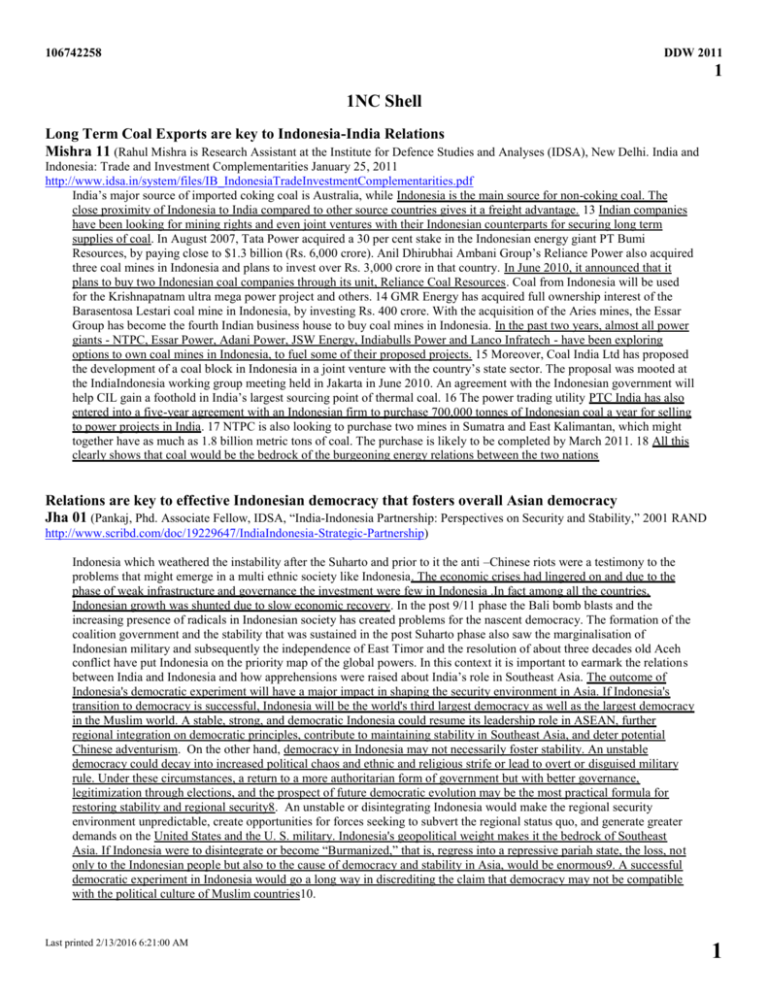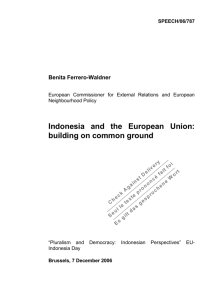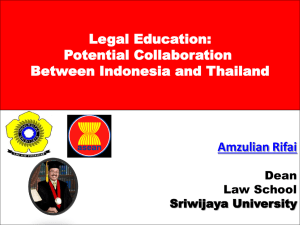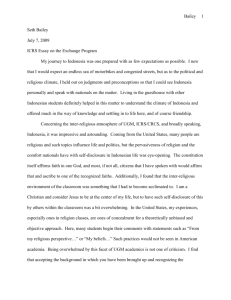Indonesia India Energy Trade Good
advertisement

106742258 DDW 2011 1 1NC Shell Long Term Coal Exports are key to Indonesia-India Relations Mishra 11 (Rahul Mishra is Research Assistant at the Institute for Defence Studies and Analyses (IDSA), New Delhi. India and Indonesia: Trade and Investment Complementarities January 25, 2011 http://www.idsa.in/system/files/IB_IndonesiaTradeInvestmentComplementarities.pdf India’s major source of imported coking coal is Australia, while Indonesia is the main source for non-coking coal. The close proximity of Indonesia to India compared to other source countries gives it a freight advantage. 13 Indian companies have been looking for mining rights and even joint ventures with their Indonesian counterparts for securing long term supplies of coal. In August 2007, Tata Power acquired a 30 per cent stake in the Indonesian energy giant PT Bumi Resources, by paying close to $1.3 billion (Rs. 6,000 crore). Anil Dhirubhai Ambani Group’s Reliance Power also acquired three coal mines in Indonesia and plans to invest over Rs. 3,000 crore in that country. In June 2010, it announced that it plans to buy two Indonesian coal companies through its unit, Reliance Coal Resources. Coal from Indonesia will be used for the Krishnapatnam ultra mega power project and others. 14 GMR Energy has acquired full ownership interest of the Barasentosa Lestari coal mine in Indonesia, by investing Rs. 400 crore. With the acquisition of the Aries mines, the Essar Group has become the fourth Indian business house to buy coal mines in Indonesia. In the past two years, almost all power giants - NTPC, Essar Power, Adani Power, JSW Energy, Indiabulls Power and Lanco Infratech - have been exploring options to own coal mines in Indonesia, to fuel some of their proposed projects. 15 Moreover, Coal India Ltd has proposed the development of a coal block in Indonesia in a joint venture with the country’s state sector. The proposal was mooted at the IndiaIndonesia working group meeting held in Jakarta in June 2010. An agreement with the Indonesian government will help CIL gain a foothold in India’s largest sourcing point of thermal coal. 16 The power trading utility PTC India has also entered into a five-year agreement with an Indonesian firm to purchase 700,000 tonnes of Indonesian coal a year for selling to power projects in India. 17 NTPC is also looking to purchase two mines in Sumatra and East Kalimantan, which might together have as much as 1.8 billion metric tons of coal. The purchase is likely to be completed by March 2011. 18 All this clearly shows that coal would be the bedrock of the burgeoning energy relations between the two nations Relations are key to effective Indonesian democracy that fosters overall Asian democracy Jha 01 (Pankaj, Phd. Associate Fellow, IDSA, “India-Indonesia Partnership: Perspectives on Security and Stability,” 2001 RAND http://www.scribd.com/doc/19229647/IndiaIndonesia-Strategic-Partnership) Indonesia which weathered the instability after the Suharto and prior to it the anti –Chinese riots were a testimony to the problems that might emerge in a multi ethnic society like Indonesia. The economic crises had lingered on and due to the phase of weak infrastructure and governance the investment were few in Indonesia .In fact among all the countries, Indonesian growth was shunted due to slow economic recovery. In the post 9/11 phase the Bali bomb blasts and the increasing presence of radicals in Indonesian society has created problems for the nascent democracy. The formation of the coalition government and the stability that was sustained in the post Suharto phase also saw the marginalisation of Indonesian military and subsequently the independence of East Timor and the resolution of about three decades old Aceh conflict have put Indonesia on the priority map of the global powers. In this context it is important to earmark the relations between India and Indonesia and how apprehensions were raised about India’s role in Southeast Asia. The outcome of Indonesia's democratic experiment will have a major impact in shaping the security environment in Asia. If Indonesia's transition to democracy is successful, Indonesia will be the world's third largest democracy as well as the largest democracy in the Muslim world. A stable, strong, and democratic Indonesia could resume its leadership role in ASEAN, further regional integration on democratic principles, contribute to maintaining stability in Southeast Asia, and deter potential Chinese adventurism. On the other hand, democracy in Indonesia may not necessarily foster stability. An unstable democracy could decay into increased political chaos and ethnic and religious strife or lead to overt or disguised military rule. Under these circumstances, a return to a more authoritarian form of government but with better governance, legitimization through elections, and the prospect of future democratic evolution may be the most practical formula for restoring stability and regional security8. An unstable or disintegrating Indonesia would make the regional security environment unpredictable, create opportunities for forces seeking to subvert the regional status quo, and generate greater demands on the United States and the U. S. military. Indonesia's geopolitical weight makes it the bedrock of Southeast Asia. If Indonesia were to disintegrate or become “Burmanized,” that is, regress into a repressive pariah state, the loss, not only to the Indonesian people but also to the cause of democracy and stability in Asia, would be enormous9. A successful democratic experiment in Indonesia would go a long way in discrediting the claim that democracy may not be compatible with the political culture of Muslim countries10. Last printed 2/13/2016 6:21:00 AM 1 106742258 DDW 2011 1 That’s key to global democracy promotion – solves war, terrorism, environmental collapse, and disease Larry Diamond, senior fellow at the Hoover Institution, ‘7 (Times of India, "India, Take the Lead," December 13 th 2007, http://timesofindia.indiatimes.com/Opinion/Editorial/LEADER_ARTICLE_India_Take_The_Lead/articleshow/2617945.cm) Whether it wants to be so or not, whether it is ready for this role or not, India is becoming a global power. In the years to come, India will have to decide what kind of global power it wants to be. With its economic might, its military power, and its "soft power" all increasing steadily, India will find it increasingly difficult to continue its traditional foreign policy of non-alignment and nonintervention. Americans are in an awkward position to appeal to another rising power to promote democracy, as our own engagement for demo-cracy abroad over time has contained more than a little neocolonialism, unilateralism and hypocrisy. However, in the last three decades, this has been partially supplanted by increasingly effective efforts (especially when multilateral, practical and softspoken) to assist democratic development around the world. One must also acknowledge the serious problems with India's own democracy: tenacious poverty and inequality, troubling levels of political violence and criminality in some states, and a fragmented political party system that makes it difficult to take decisions. In the face of acute challenges, it is understandable for India to want to be able to focus on its own problems. Yet the established democracies of the world share a strong common interest in trying to bring about a more democratic world, and India's help is sorely needed in this cause. The global balance of power, of economic energy, and of moral authority is tilting from North to South. And the global environment for democracy is less favourable than at any time since the fall of the Berlin Wall, as an oil-rich Russia turns its back on Europe and democracy, a booming authoritarian China casts a lengthening shadow over Asia and now Africa as well, and democracy gasps for life in such crucially important countries as Pakistan, Bangladesh, Thailand, the Philippines, Nigeria and Venezuela. There are still a lot more democracies in the world than there were in 1989, but the momentum is reversing, and many democracies are in danger. There are several reasons why India should care. First, India's own democracy could be affected by what happens regionally and globally. Recall that emergency rule fell upon India at a lowpoint for democracy in Asia and the world. Democracies thrive in regions where they enjoy the reinforcing legitimacy and mutual security of other democracies. Second, by engaging other democracies around the world, India will also draw solidarity and some lessons that could be useful for its own democratic reform. All democracies in the world today are imperfect, and we all need to learn from one another. Third, a more democratic world will be a more secure world for us all. Democracies do not go to war against one another. And they do a much better job of advancing human well-being and protecting the environment. Moreover, terrorism emanates disproportionately from authoritarian soil. We are threatened in common with a global crisis of climate change that dwarfs anything human civilisation has ever confronted. And the pathologies of badly governed states - terrorism, crime, corruption, environmental stress, infectious disease - spill across borders more quickly and vengefully than ever before. India does not need a radical reorientation of its foreign policy in order to make a difference to democracy in the world. It has an exceptionally rich history of democratic practice and experience to share with other developing democracies. Some of the obvious realms of experience that India has to share include: the evolution and functioning of federalism, the management of ethnic and religious conflict, the constitutional court, state and local government, electoral administration, the independent mass media and civil society. A very useful first step would be to bring practitioners and scholars from emerging democracies to India for periods of time to study how democracy works and has developed here. New institutions could be established and existing Indian think tanks and organisations could be supported to host such visits. Of course the United States does quite a bit of this. But how relevant is the highly expensive and decentralised American (or even European) model of democracy for Asia and Africa? We would all be better off sending more democrats to countries like India and South Africa. And conducting these exchanges would be an excellent and also ethical way for India to extend its soft power at a time when China is doing so for much more brazenly commercial and strategic ends. If India were to establish an institution to coordinate and organise exchanges with democrats around the world, richer democracies in the world would want to join with it and help to fund it. And in the near term, we have a ready potential vehicle. The UN Democracy Fund has recently been established, with a substantial budget that includes sizable contributions from India and the United States. It is a natural candidate to provide early support for such a new initiative. India should join the worldwide movement for democracy because doing so is in India's own national interest, not because the West asks it. But the democratic West has obligations to India that it must fulfil in the process. If we are asking India to play more of a leader-ship role on the world stage, than we must make room for that leadership. This should include India's permanent membership on the UN Security Council and its inclusion in global agenda-setting dialogues, such as the G8. Last printed 2/13/2016 6:21:00 AM 2 106742258 DDW 2011 1 Indian Ocean Stability Impact India/Indonesia relations solve Indian Ocean Instability – great power conflict Gupta 11 (Sourabh Gupta is a Senior Research Associate at Samuels International Associates, Inc., and a contributor to EAF. A longer version of this commentary was originally published here as an East-West Center Asia Pacific Bulletin on 11 March 2011. http://www.eastasiaforum.org/2011/03/20/india-indonesia-ties-charting-an-ambitious-path-forward/ Reciprocally, Jakarta, given its shared maritime border and increasing familiarity with the Indian Navy, could invite New Delhi to join MALSINDO, the Trilateral Coordinated Patrols for the Malacca Straits initiative, which has significantly arrested acts of piracy and crime in and around the straits. Down the line, both countries could consider innovative new formats for maritime cooperation, including the exchange of actionable intelligence, with trusted sub-regional partners such as Australia. Further, both Indonesia and India could usefully take advantage of the nascent ASEAN Defence Ministers’ Meeting-Plus (ADMM+) expert working group machinery, which pairs an ASEAN member state and a non-member state as co-chairs, to initiate a discussion on norms related to regional maritime security and jurisdictional issues. On increasingly sensitive issues such as ‘innocent passage’ of foreign-flagged ships in territorial waters and the distinction between marine scientific research and military hydrographic survey in foreign exclusive economic zones (EEZs), both countries, after all, encounter similar dilemmas and hold overlapping views. Along the way, the two countries could also set the tone on how leadership can collaboratively be exercised in the Indian Ocean region, progressively an arena of great power contestation. Last printed 2/13/2016 6:21:00 AM 3 106742258 DDW 2011 1 Terrorism Impact Strong relations deter terrorism Jha 01 (Pankaj, Phd. Associate Fellow, IDSA, “India-Indonesia Partnership: Perspectives on Security and Stability,” 2001 RAND http://www.scribd.com/doc/19229647/IndiaIndonesia-Strategic-Partnership) In terms of security and stability Indonesia is important because of the fact that it has set up example to the international community with regard to harmonious relations between different communities and also has initiated methods to counter terrorism. Indonesian has for long been the fulcrum of any regional initiatives be it the formation of ASEAN or even ARF. Indonesia has contiguous maritime boundary with India and due to Andaman Nicobar Joint command emerging as a major strategic move of India in the region, Indonesia comes as a strategically important country for India. Also India’s move in the region in the past has been observed keenly by Indonesia during the cold war years be it the formation of Bangladesh or even the plan to form the Andaman command in 1980s. Though it can be stated that these issues were raised by US, so as to 8 thwart any attempts for USSR to find a footing in the strategically important Indian Ocean region. In the current context it has been in both India and Indonesia’s interest to have greater strategic partnership so as to secure Indian Ocean and even Malacca Straits of any external power domination. Indonesia has been taking steps in this regard with help from Malaysia and to a certain extent by Singapore while in order to secure Indian Ocean, Indian Navy is also enhancing its strategic reach. These steps are not mutually exclusive as India has time and again reiterated its stance with regard to the security of sea lanes and has also wanted the security of South China Sea without annoying any of the claimants of the Spratlys islands. Indonesia also gains importance with regard to the alternative routes it provides in case of any accident in Malacca Straits. Indonesia has also seen influx of radical Islamic organisations like Hizb ut tehrir which has endorsed establishment of Islamic caliphate across the Muslim majority countries in Asia and the conference though did draw a large crowd but the influx of radical Islam has been refuted by Indonesian population. This has been projected by the loss of radical Muslim candidates in the local and provincial elections in Indonesia, barring the case of Aceh which has resorted to autonomy under Indonesia. The question arises that time and again radical elements in Indonesian society has projected democracy to be main culprit in terms of the suffering of people, though the reason was refuted by the general public. Indonesia has shown keenness to cooperate with India for the security and stability in the region and also a number of scholars have pointed to India as an example of the more tolerant and developed society as the basic framework of prosperity. India and Indonesia being the two big nations geographically in southern Asia have a mutual interest in maintaining security in the region and also within the nations. Unchecked terrorism will result in extinction Yonah Alexander, professor and director of the Inter-University for Terrorism Studies in Israel and the United States. “Terrorism myths and realities,” The Washington Times, August 28, 2003 Unlike their historical counterparts, contemporary terrorists have introduced a new scale of violence in terms of conventional and unconventional threats and impact. The internationalization and brutalization of current and future terrorism make it clear we have entered an Age of Super Terrorism [e.g. biological, chemical, radiological, nuclear and cyber] with its serious implications concerning national, regional and global security concerns. Two myths in particular must be debunked immediately if an effective counterterrorism "best practices" strategy can be developed [e.g., strengthening international cooperation]. The first illusion is that terrorism can be greatly reduced, if not eliminated completely, provided the root causes of conflicts - political, social and economic - are addressed. The conventional illusion is that terrorism must be justified by oppressed people seeking to achieve their goals and consequently the argument advanced by "freedom fighters" anywhere, "give me liberty and I will give you death," should be tolerated if not glorified. Last printed 2/13/2016 6:21:00 AM 4 106742258 DDW 2011 1 UQ India energy exports to Indonesia are longterm and increasing now Reuters 5/30/11 (“China coal imports to double in 2015, India close behind” http://www.bestgrowthstock.com/stock-marketnews/2011/05/30/china-coal-imports-to-double-in-2015-india-close-behind/ ACC 8/7/11) Indonesia’s coal mining companies are already cranking up production to meet the fast pace of demand growth, and the country and Kamandanu forecast the country would produce 340 million tonnes this year up from 320 million tonnes in 2010. “All the big guys are increasing their numbers,” he said. Bayan Resources Tbk , the country’s eighth-largest coal miner, is projected to more than double its output to as much as 25 million tonnes by 2013 versus last year, said chief financial officer Alastair McLeod. The company’s main focus was on striking long-term supply deal to India, he added. Bayan expects to produce 14.5 million to 15.5 million tonnes in 2011, up from 11.9 million tonnes in 2010, he told Reuters in an interview. “We started two new mines in 2008 and two new mines in 2009, therefore they have a ramp-up profile over four or five years before they get up to their capacity,” McLeod said. “We’ll be continually ramping up — our target by 2013 is to get to 20-25 million tonnes.” Another major Indonesian coal producer, Bhakti Energi, is also eyeing the stiffening competition between China and India for Indonesian supplies. “India has no alternative for its energy resources. India will become a very good importer for Indonesia,” said Bhakti’s president director Jeffrey Mulyono. “China is different. China is growing well in demand but they still have alternatives for fulfilling (coal) combinations with their own development.” Mulyono expects Indonesian coal output to rise at least 10 percent annually over five years, and sees the easternmost province of Papua tapping into its huge coal reserves longer-term. Last printed 2/13/2016 6:21:00 AM 5






